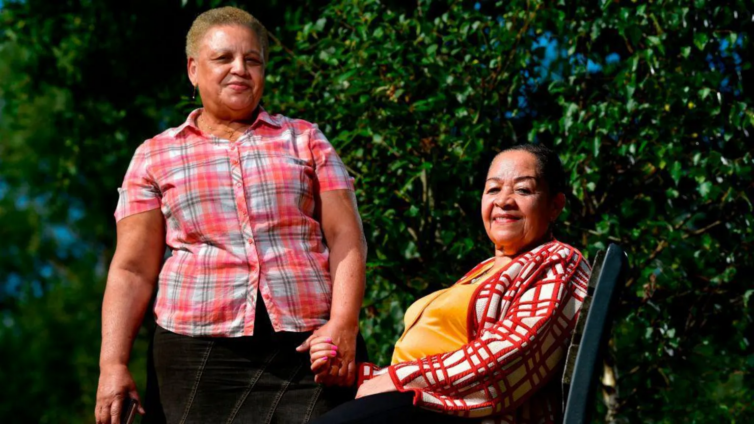A Belgium court has ordered the government to pay reparations to five mixed-race women who were forcibly removed from their families in the colonial-era Belgian Congo.
The women, now in their 70s, were taken from their mothers when they were young children and placed in orphanages under a state policy.
The court said the government had a "plan to systematically search for and abduct children born to a black mother and a white father".
On Monday judges called this a crime against humanity and said the kidnappings were "an inhumane act of persecution".
The Belgium government in 2019 issued a formal apology to an estimated 20,000 victims of forced family separations in DR Congo, as well as Burundi and Rwanda.
DR Congo was governed by Belgium as a colony from 1908 to 1960.
Monique Bitu Bingi, Léa Tavares Mujinga, Noëlle Verbeken, Simone Ngalula and Marie-José Loshi launched a legal case for compensation in 2021.
They were all taken by the state under the age of seven and placed in orphanages mainly managed by the Catholic Church.
Bitu Bingi had previously told AFP news agency: "We were destroyed. Apologies are easy, but when you do something you have to take responsibility for it."

Their legal fight succeeded on Monday in the Brussels Court of Appeal which overturned an earlier court's ruling which found too much time had passed for them to be eligible for reparations.
As the court ruled the state's actions a crime against humanity, this removed any statute of limitations.
"The court orders the Belgian State to compensate the appellants for the moral damage resulting from the loss of their connection to their mother and the damage to their identity and their connection to their original environment," the judges said.
The women had asked for an initial payment of €50,000 (£41,400).
This is the first case in Belgium to have highlighted the estimated 20,000 children born to white settlers and local black women who were forcibly removed from their families during the 1940s and 1950s.
Most white fathers refused to recognise their mixed-race children or acknowledge paternity, and the children also did not automatically receive Belgian nationality.
As such they were taken into state care and placed in Church-run orphanages, where in many cases they endured further abuse.
In 2017, the Catholic church apologised to the victims for its part in the scandal.
And in 2019, the Belgian government apologised for its involvement as part of a "step towards awareness and recognition of this part of our national history".
Latest Stories
-
Wa Youth Resource Centre to boost skills development – Sports Minister
5 mins -
Today’s front pages: Wednesday, December 4,2024
8 mins -
Impasse in parliament affecting completion of debt restructuring agreement with IPPs – Finance Minister
34 mins -
How does the new Club World Cup work, and why is it so controversial?
1 hour -
Nana Kwame Bediako proposes construction of more state-owned football academies
1 hour -
Watching football frequently is a waste of time – Nana Kwame Bediako
2 hours -
‘We have wasted taxpayers money’ – Herbert Mensah on Ghana’s sporting decline
2 hours -
No African-based quality; achieve international healthcare standards with local solutions – SafeCare Founder
3 hours -
UHC alone insufficient without quality healthcare – PharmAccess CEO warns
3 hours -
CHAG to receive GH¢2.2bn boost; GH¢110m earmarked for 2025 recruitment – MoH
3 hours -
Ghana Industry CEO Awards: Bright Ladzekpo is Most Respected Advertising CEO
3 hours -
Video: Fatawu Issahaku joins Leicester dressing room celebrations after win over West Ham
3 hours -
Kempinski lights up the festive season in grand style
4 hours -
‘We’ll seal every ballot box’ – NDC’s Tanko-Computer slams Ashanti Regional EC boss for blocking party seals
4 hours -
39 CHAG facilities achieve SafeCare Level 4 – Executive Director
4 hours

